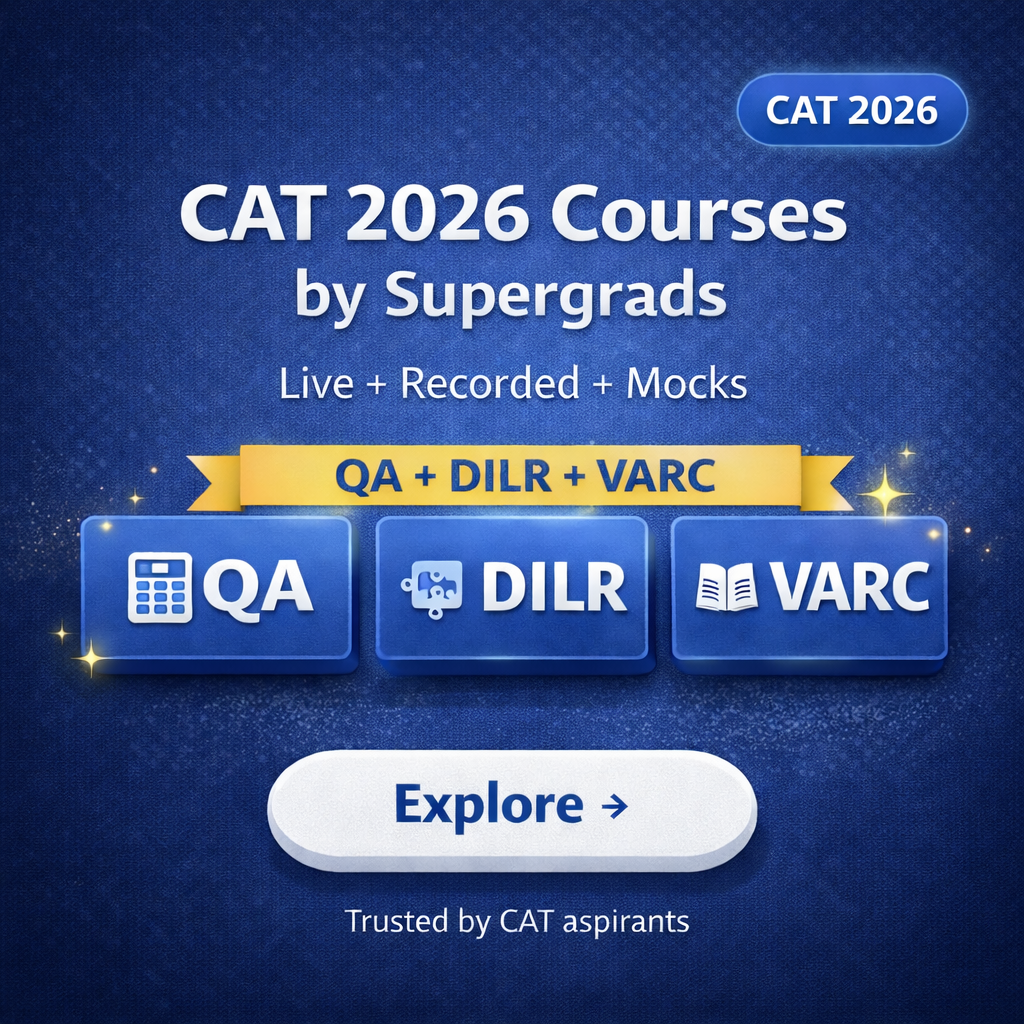CAT Exam Eligibility 2026: Age Limit, Education Qualification & Reservation Policy
January 12, 2026
CAT Exam Eligibility 2026 is simple: you can apply if you have a recognised bachelor’s degree (or you’re in the final year) with the required minimum marks. Eligibility rules mainly cover graduation %, category-wise relaxation, final-year status, and basic reservation requirements.
CAT Exam Eligibility 2026 (Quick Answer)
- Minimum qualification: Bachelor’s degree (or equivalent) from a recognised university/institution
- Minimum marks: 50% (General/EWS/NC-OBC) | 45% (SC/ST/PwD)
- Final-year students: Eligible (admission is provisional until you submit required proof within the IIM deadline)
- Professional courses: CA/CS/CMA (ICWA)/FIAI are also accepted with the required %
- Age limit / attempt limit: No age bar and no restriction on attempts
Note: Meeting CAT eligibility only allows you to take the exam. Each IIM can have stricter shortlisting and admission criteria later.
Looking for the full CAT 2026 overview? Check CAT Exam 2026 for exam dates, notification, pattern and syllabus.
CAT Exam Eligibility 2026: Quick Checklist
You are eligible if:
- You have completed a bachelor’s degree from a recognised university (category-wise minimum marks apply).
- You are in the final year of graduation and can fulfil degree completion requirements within the stipulated time.
- You meet category/PwD requirements as per applicable rules.
You may not be eligible if:
- You have not completed graduation and are not in the final year at the time of application.
- You are unable to produce required degree/mark documents within the required timeline.
What is CAT Exam Eligibility?
CAT exam eligibility refers to the minimum educational qualification and category-wise marks criteria required to apply for the CAT exam, along with rules for final-year candidates and related conditions set by the conducting IIM.
Before you start filling the CAT 2026 application form, go through these key points:
- Minimum qualification: Bachelor’s degree in any stream from a recognised university or equivalent institution.
- Minimum marks: 50% aggregate for General/EWS/NC-OBC and 45% for SC/ST/PwD candidates.
- Final-year students: Eligible to apply, provided you complete your degree with the required percentage within the deadline set by the IIMs.
- CAT age limit: There is no upper age limit and no cap on the number of attempts for CAT 2026.
- Reservation & category rules: CAT eligibility criteria and seat reservation follow Government of India norms for SC, ST, NC-OBC, EWS and PwD categories.
In this guide, we have explained the CAT 2026 eligibility criteria in detail including education qualification, percentage calculation, age limit, reservation policy, final-year and backlog cases – so you can check your status confidently before registering.
CAT 2026 Eligibility Criteria: Major Highlights
What is the eligibility for the CAT exam? Here are the key factors that determine eligibility for the CAT exam 2026:
Here is the CAT exam eligibility 2026 at a glance. Use this quick table to check the major CAT 2026 eligibility criteria before filling out the form:
| CAT 2026 Eligibility Parameter | Requirement |
|---|---|
| CAT age limit | No minimum or maximum age limit for CAT 2026 |
| Minimum qualification | Bachelor’s degree in any discipline or equivalent from a recognised university/institution |
| Minimum marks in graduation | 50% aggregate (or equivalent CGPA) for General/EWS/NC-OBC and 45% for SC/ST/PwD candidates |
| Final-year students | Eligible to apply, subject to completing the degree with the required percentage and providing a certificate within the deadline |
| University recognition | Degree must be from a university/institution recognised by UGC/AICTE/MHRD or an equivalent statutory body |
| Work experience | Not compulsory; freshers and working professionals can both apply |
| Reservation criteria | Seats reserved for SC, ST, NC-OBC, EWS and PwD as per Government of India norms |
| Nationality | CAT eligibility is primarily defined by academic qualification/marks. For NRI/OCI/foreign national-specific admission rules, refer to the official CAT bulletin and institute-level admission policies. |
| Number of attempts | No restriction on the number of CAT attempts |
| Age relaxation | Not applicable as there is no age limit in CAT 2026 |
CAT 2026 Important Dates (Expected Timeline)
These dates are tentative and will be updated as soon as the official CAT 2026 notification is released. For reference, in the last official cycle (CAT 2025), the registration window ran from Aug 01 to Sep 13, and the exam was held on Nov 30, 2025.
| Event | Expected Date (Tentative) |
|---|---|
| CAT 2026 Notification Release | July 2026 |
| CAT 2026 Registration Starts | August 2026 |
| CAT 2026 Registration Last Date | September 2026 |
| CAT 2026 Admit Card Download Begins | November 2026 |
| CAT 2026 Exam Date | Last Sunday of November 2026 |
| CAT 2026 Result Declaration | First week of January 2027 |
Tip: Eligibility doesn’t change with dates so focus first on your graduation marks, category criteria, and final-year conditions, then track the official timeline once the notification is out.
Also Check | List of CAT Preparation Books in 2026
CAT Exam Eligibility 2026: Education Qualification
The CAT exam eligibility 2026 clearly defines which academic backgrounds are accepted and what minimum percentage you must secure. The table below summarises the educational qualifications, required affiliation, and category-wise pass percentage for CAT 2026:
| Educational Qualification | Affiliation / Recognition Required | Minimum % (General / EWS / NC-OBC) | Minimum % (SC / ST / PwD) |
|---|---|---|---|
| Bachelor’s Degree in any discipline | University or institution recognised by UGC or an equivalent statutory body | 50% aggregate or equivalent CGPA | 45% aggregate or equivalent CGPA |
| Engineering Degree (BE / BTech or equivalent) | Institution recognised / approved by MHRD / AICTE / UGC | 50% aggregate or equivalent CGPA | 45% aggregate or equivalent CGPA |
| Professional Qualifications (CA / CS / ICWA / FIAI) | Certification from the respective professional body (ICAI / ICSI / ICMAI / Institute of Actuaries of India) | 50% aggregate marks or equivalent | 45% aggregate marks or equivalent |
| Final-year students of Bachelor’s degree or equivalent | Currently enrolled in a recognised programme and expected to complete degree requirements within the deadline set by IIMs | Must secure at least 50% in the final result | Must secure at least 45% in the final result |
Note: Candidates must produce proof of meeting the CAT 2026 eligibility criteria (marksheets / degree / provisional certificate) within the timeline specified by the IIMs. Failure to do so can lead to cancellation of admission, even if you clear the CAT exam and selection rounds.
Refer | CAT 2026 Exam Pattern
Who is NOT eligible for CAT 2026?
- No recognised bachelor’s degree/equivalent (degree/institution not recognised by the applicable statutory body).
- Graduation marks below the minimum requirement (less than 50% for General/EWS/NC-OBC or less than 45% for SC/ST/PwD).
- Final-year candidates who can’t submit proof on time (if you don’t complete the degree requirements or can’t provide the required certificate within the deadline set by the IIMs).
Note: Meeting CAT eligibility only lets you take the exam—each IIM’s shortlisting/admission criteria can be stricter.
CGPA to Percentage Conversion for CAT (Exact Rule)
Your percentage is calculated as per your university’s official conversion method. If your university confirms there is no conversion scheme, then:
Percentage (%) = (Your CGPA ÷ Maximum Possible CGPA) × 100
| Example | Calculation | Result |
|---|---|---|
| CGPA 7.2 out of 10 | (7.2 ÷ 10) × 100 | 72% |
Pro tip: Always follow your university’s certified conversion rule first (if available), and keep that document handy.
1767080585.webp)
Category-wise CAT Exam Eligibility Percentage 2026
The CAT 2026 eligibility criteria specify different minimum graduation percentages for different categories. Use this table to quickly check the CAT exam eligibility percentage 2026 as per your category:
| Category | Minimum % in Bachelor’s Degree (Aggregate or Equivalent CGPA) |
Details |
|---|---|---|
| General | 50% | Must score at least 50% aggregate or equivalent CGPA in a recognised bachelor’s degree. |
| EWS | 50% | Same minimum percentage as General category, with valid EWS certificate as per Government norms. |
| OBC (NC-OBC) | 50% | Non-Creamy Layer OBC candidates must secure at least 50% aggregate or equivalent CGPA. |
| SC | 45% | Relaxation of 5% in minimum marks compared to General category as per CAT eligibility rules. |
| ST | 45% | Minimum 45% aggregate or equivalent CGPA in graduation from a recognised university. |
| PWD (Persons with Disabilities) | 45% | Applicable to candidates with benchmark disabilities, with 5% relaxation in required marks. |
Note: If you fall under more than one category (for example, SC + PwD), the lower minimum percentage applies, but you must upload valid certificates for every category claimed.
Check | List of CAT 2026 Exam Centres
CAT Exam Eligibility Criteria 2026: Reservation Policy
The CAT 2026 eligibility criteria follow the Government of India’s reservation rules for different categories. These reservations apply at the IIM admission stage, provided you meet the basic CAT exam eligibility 2026 (education, percentage and other requirements) and submit valid certificates.
| Category | Reservation in Seats |
|---|---|
| Scheduled Caste (SC) | 15% |
| Scheduled Tribe (ST) | 7.5% |
| Other Backward Classes – Non-Creamy Layer (NC-OBC) | 27% |
| Economically Weaker Sections (EWS) | 10% |
| Persons with Benchmark Disabilities (PwD) | 5% |
Reservation & Category Documents: What You Should Keep Ready
CAT registration captures your category details, and you may be required to upload/produce supporting documents as per the official bulletin and institute admission rules. To avoid last-minute issues, keep the following ready.
| Category | Certificate/Proof | Important Notes |
|---|---|---|
| SC / ST | Caste/Tribe certificate (competent authority format) | Ensure the name/DOB matches your CAT application & ID proofs. |
| NC-OBC | NC-OBC certificate + non-creamy layer status proof (as per bulletin format) | Certificate validity & format must match the latest bulletin requirements. |
| EWS | EWS certificate (as per bulletin format) | Follow the latest bulletin’s issue-date/validity rules (changes year to year). |
| PwD | PwD/Disability certificate (as per prescribed guidelines) | Keep the % disability and issuing authority details clear and verifiable. |
| General | No category certificate needed | Still keep graduation marksheets/degree proofs ready. |
Common mistakes that lead to rejection (avoid these)
- Uploading an old/expired certificate when the bulletin asks for a recent validity window.
- Using a certificate format that doesn’t match the bulletin template.
- Name/DOB mismatch between certificate, CAT form, and photo ID proofs.
- Choosing a category during registration and assuming it can be changed later (corrections are usually limited).
Best practice: Download the official certificate templates (if provided) from the CAT portal/bulletin and cross-check your document format before submitting the form.
Important: To claim reservation under SC/ST/NC-OBC/EWS/PwD categories, you must upload valid and updated certificates in the format prescribed by the Government of India and the IIMs. If your documents are invalid or outdated, your category may be treated as General during the admission process.
Also Read | CAT Books: List of 11 Best Books for CAT 2026 Preparation
CAT Exam Eligibility Criteria 2026: Age Limit Factor
One of the biggest advantages of CAT exam eligibility 2026 is that there is no age bar. Unlike some government exams, the CAT age limit does not restrict you from appearing at a particular age or after a certain number of attempts.
| CAT 2026 Age-related Parameter | Details |
|---|---|
| Minimum age limit | No specific minimum age mentioned. You simply need to have (or be about to complete) a recognised bachelor’s degree with the required percentage. |
| Maximum age limit | No upper age limit for CAT 2026. You can appear at any stage of your career as long as you meet the academic eligibility. |
| Number of attempts | No cap on attempts. You can take CAT multiple times to improve your score and target better IIMs or MBA colleges. |
This means working professionals, graduates who took a break, and freshers all fall under the same CAT 2026 eligibility criteria for age, as long as the education and percentage requirements are satisfied.
CAT Eligibility vs IIM Admission Criteria: What’s the Difference?
Many students search “CAT eligibility” but actually mean “Will I get into an IIM?” These are two different things. CAT eligibility decides whether you can take the exam. IIM admission criteria decide whether you get shortlisted and selected.
| Factor | CAT Exam Eligibility (to appear in CAT) | IIM Admission Criteria (shortlisting & selection) |
|---|---|---|
| Who sets it? | CAT conducting IIM (CAT rules) | Each IIM separately (their admission policy) |
| What it decides? | Whether you can fill the CAT form & write the exam | Whether you get shortlisted for WAT/PI and final selection |
| Key criteria | Graduation degree + minimum marks/CGPA, category rules, final-year eligibility | CAT percentile + academics (10th/12th/graduation), work experience, diversity, WAT/PI score, etc. |
| Can it vary? | Mostly fixed for the year | Yes, different across IIMs and can change every year |
| Bottom line | Eligible to write CAT ≠ guaranteed IIM shortlist | Your profile + CAT score together impact admission |
Documents Required for CAT Exam Eligibility (Checklist)
Keep these ready while filling the CAT form and during later verification/shortlisting stages:
- Class 10 & 12 mark sheets (details often used in IIM shortlisting)
- Graduation mark sheets (all semesters/years available)
- Degree certificate / Provisional certificate (for completed graduates)
- Final-year certificate (if applicable, as per prescribed format/deadline)
- Valid photo ID (Aadhaar/Passport/Driving Licence/PAN etc.)
- Category certificate (SC/ST/NC-OBC/EWS) in the required format, if applicable
- PWD certificate (if applicable, for PwD benefits)
- Work experience documents (offer letter/salary slips) – helpful for IIM forms later
Tip: If your university uses CGPA, keep your official conversion formula handy (or follow the university’s stated method).
Latest Updates about IIMs Admission Process
To simplify the MBA admission process, four leading Indian Institutes of Management (IIMs) have introduced a Joint Admission Process (JAP) for the 2026-2027 academic session. This initiative is designed to benefit MBA aspirants by streamlining a typically complex application procedure.
- Joint Admission Process (JAP) 2026: Four IIMs—IIM Kashipur, IIM Raipur, IIM Ranchi, and IIM Tiruchirappalli—have collaborated to launch a single admission process for their MBA programs.
- IIM Raipur will act as the coordinating institute, managing the entire JAP for all four participating IIMs.
- Candidates can now apply to all four of these IIMs through a single, unified application window after their CAT 2025 results are declared.
- The new process is intended to reduce administrative duplication, save time for applicants, and increase transparency in the admission journey.
Use SuperGrads Free Resources 2026Strategically
| CAT VARC Mock Test 2026 | |
| CAT DILR Mock test 2026 | |
| CAT QA Mock Test 2026 | |
| CAT VARC Prep Videos 2026 | |
| CAT DILR Prep Videos 2026 | |
| CAT QA Prep Videos 2026 | |
| CAT Syllabus 2026 | |
| CAT PYQs | |
| CAT VARC Questions |
CAT Exam Eligibility 2026: Is Work Experience Compulsory?
A common doubt among aspirants is whether work experience is mandatory under the CAT 2026 eligibility criteria. The answer is simple – no, you can appear for CAT 2026 even if you are a complete fresher.
| Work Experience Parameter | Eligibility Status for CAT 2026 |
|---|---|
| Is work experience required to apply for CAT? | No. You can apply as a fresher after graduation or in your final year. |
| Can working professionals apply? | Yes. Candidates with any length of work experience can appear for CAT 2026. |
| Does work experience affect eligibility? | No. It does not affect CAT exam eligibility 2026, but it may be given weightage in IIM selection criteria. |
| Is there any minimum or maximum work experience limit? | No fixed limit. Different IIMs may consider work ex differently during shortlisting and final selection. |
So, both fresh graduates and experienced professionals are equally eligible to appear for CAT 2026. The difference usually comes during the personal interview and final selection stage, where some IIMs may award extra points for relevant work experience.
Also Read | How To Get into IIM Without CAT: Process and Admission
Who is Not Eligible for CAT 2026?
Even though the CAT 2026 eligibility criteria are quite flexible, there are some cases where a candidate will not be considered eligible for CAT 2026:
- Candidates without a recognised bachelor’s degree: If your course or institution is not recognised by UGC, AICTE, MHRD or an equivalent statutory body.
- Candidates who do not meet the minimum percentage: Less than 50% aggregate (General/EWS/NC-OBC) or 45% (SC/ST/PwD) in graduation.
- Candidates who fail to complete their degree on time: Final-year students who do not pass their exams or cannot produce proof of qualifying within the deadline set by the IIMs.
- Candidates with falsified or incorrect information: Any mismatch in marks, category, or personal details can lead to cancellation of candidature at any stage.
- Candidates with invalid category certificates: Outdated, wrong-format or fake SC/ST/OBC/EWS/PwD certificates will result in loss of category benefits or rejection.
If you fall into any of these situations, you may not satisfy the CAT exam eligibility 2026 and should resolve these issues before applying.
Once you have checked the CAT 2026 eligibility criteria, the next step is to understand the CAT exam pattern 2026 and go through the detailed CAT syllabus 2026 so you can start your preparation in the right direction.
CAT Exam Eligibility 2026: Persons with Benchmark Disabilities
Under the Rights of Persons with Disabilities Act, 2016, 5% of seats are reserved for Persons with Benchmark Disabilities (PwD), defined as individuals with at least 40% of a specified disability, as certified by an authority.
The Act lists specific disabilities, including blindness, deafness, locomotor disabilities, autism, intellectual disabilities, and more, ensuring inclusive education opportunities.
Note: Candidates from reserved categories (SC/ST/NC-OBC/EWS/PwD) should review eligibility for CAT exam carefully before applying. Although IIMs aim to adhere to legal reservation proportions, these candidates must meet minimum eligibility and performance standards for admission consideration.
Check | List of Top MBA Colleges Accepting CAT 2026 Scores
Can Students in the Last Year of their Bachelor's Degree Apply?
Yes! Candidates appearing for the final year of the Bachelor’s degree/equivalent qualification examination and those who have completed degree requirements and are awaiting results can also apply.
However, it may be noted that if selected, you will be allowed to join the program provisionally and only if you submit a certificate from the Registrar of your University (issued on or before the date as stipulated by the respective IIM) stating that you have completed all the requirements for obtaining the Bachelor’s degree on the date of issue of the certificate.
Check | Download CAT 2026 Admit Card
CAT Exam Eligibility 2026: Understanding Percentage Calculation Criteria
The CAT eligibility criteria percentage will be calculated based on the practice followed by the respective University or institution.
Regarding grades/ CGPA, the conversion to a percentage of marks would be based on the procedure certified by the respective University or institution.
If any University confirms that there is no scheme for converting CGPA into equivalent marks, the equivalence would be established by "dividing the candidate’s CGPA by the maximum possible CGPA and multiplying the result by 100."
Also Check | CAT Exam Analysis Section Wise
Consequences of Providing False Eligibility Claims
Providing false or inaccurate information on your CAT exam application can have serious consequences, including disqualification from the exam and the entire admissions process.
Verification of your eligibility and documents occurs at multiple stages, not just during the application. This includes during the Personal Interview (PI) and Written Ability Test (WAT) rounds, and even at the time of final admission.
Key Areas of Concern
1. CAT Reservation Category
Claiming a reserved category (SC, ST, NC-OBC, EWS, or PwD) without a valid, up-to-date certificate may result in rejection.
For instance, if your family's income exceeds the limit for the Non-Creamy Layer (NCL) OBC category, you are no longer eligible for its benefits and must apply under the general category. Failure to declare this change can result in disqualification.
2. Academic Details
Submitting incorrect marks or an unrecognised degree from a university that is not approved by the UGC/AICTE/MHRD can also lead to your application being rejected.
3. Work Experience
Falsely claiming or exaggerating your work experience is a significant risk. Admissions panels are experts at spotting lies, and if caught, it can lead to your candidature being cancelled.
Personal Information
Although some details, such as your address, can be corrected, crucial information, such as your name, date of birth, email ID, and mobile number, usually cannot be changed after registration.
It's essential to be honest and transparent throughout the application process to avoid issues later.
In some cases, if you have a valid reason for a change (e.g., your family's income changed after filling out the form), you may be able to contact the CAT authorities to update your status. However, making a deliberate false claim is a serious offence with severe repercussions.
CAT 2026 Eligibility Criteria for Final Year Students
Final-year students pursuing a bachelor's degree are eligible to appear for the Common Admission Test (CAT), provided they fulfil certain conditions. They must have secured at least 50% aggregate marks (45% for SC, ST, and PWD categories) in their undergraduate studies up to the point of application.
- Conditions for final-year candidates
- Requirement of a certificate from an institution
- Proof of graduation at the time of admission
- Risks and precautions to consider
What are the Conditions for Final-Year Candidates in CAT 2026?
Well, such candidates can apply for CAT and subsequently for admission to IIMs. However, their admission will be provisional, contingent on the submission of a certificate from their institution's Principal/Registrar/Head of Department.
This certificate must state that the candidate has completed all the requirements for the bachelor's degree by the date stipulated by the respective IIM.
Here are the requirements of a certificate from an institution:
- The certificate must be issued on or before the date specified by the admitting IIM.
- It should clearly state that the candidate has appeared for all required examinations and is awaiting the final results.
- Failure to produce this certificate by the deadline will result in the cancellation of the provisional admission.
- Proof of graduation at the time of admission: At the time of final admission to an IIM, the candidate must provide the original mark sheets and degree certificate as proof of having completed their graduation with the required percentage of marks.
Check now: How to Crack CAT exam in 2026?
Risks and precautions to consider
Here are the precautions that the applicant should consider:
- Final-year students appearing for CAT should be mindful of the academic pressure of their final year alongside the rigorous preparation required for the entrance exam.
- It is crucial to manage time effectively and maintain a balance between academic commitments and CAT preparation.
- Additionally, they should ensure that they will meet the graduation eligibility criteria within the stipulated timeframe to avoid any last-minute disappointments during the admission process.
- Careful planning and diligent effort are key to successfully navigating this dual challenge.
CAT Exam Eligibility 2026 for Candidates with Backlogs
Here's a breakdown of pointers regarding CAT age limit for candidates with backlogs:
Can students with arrears/backlogs apply?
Yes, candidates with backlogs in their bachelor's degrees are generally eligible to apply for the CAT exam.
IIM admission policies also generally do not explicitly restrict candidates with backlogs from applying for CAT.
Conditions and clarification by IIMs:
While you can appear for CAT with backlogs, you will likely need to clear all backlogs before the admission process of the respective IIM begins.
IIMs require candidates to hold a bachelor's degree with a minimum required percentage of marks (50% for the general category and 45% for reserved categories) at the time of admission.
You may need to provide a certificate from your institution stating that you have appeared for supplementary exams to clear your backlogs and are currently awaiting the results.
Ultimately, admission to IIMs is provisional until you submit proof of completing your graduation with the required marks and having cleared all backlogs.
Read More: List of best books for CAT Preparation 2026
Understanding CAT Exam Eligibility Criteria, Case Scenarios, and how to Handle them
Case 1: Applying while having active backlogs
You can apply for CAT. Focus on clearing the backlogs before the IIM admission deadlines.
Case 2: Having cleared backlogs, but results awaited
You are eligible to apply as a final-year student. You will need to submit the final degree certificate and mark sheets as proof of clearing backlogs and meeting the percentage criteria at the time of IIM admission.
Case 3: Facing supplementary exams after CAT
Inform the IIMs about your situation during the Personal Interview (PI) round and provide the necessary documentation as soon as the results are declared, ensuring it's before their admission deadline.
Impact of Backlogs on the CAT 2026 Selection Process
Backlogs may be a topic of discussion during the Personal Interview (PI) round. Be prepared to explain the reasons for the backlogs and highlight your academic improvements or other strengths.
While the CAT score is a primary factor, IIMs also consider your academic background. Clearing backlogs demonstrates responsibility and commitment, which can positively influence the selection process.
Failure to clear backlogs and provide the final degree certificate by the IIM's deadline will lead to cancellation of provisional admission, even if you have a good CAT score and performed well in other selection rounds.
Read More: CAT Preparation for Beginners 2026, Tips & Strategies
CAT Age Limit for Foreign Students / NRI / International Students
NRI students, foreign students, and International students can also apply for the CAT exam.
CAT Eligibility for NRI/OCI/Foreign Applicants (What to know)
CAT exam eligibility is primarily based on academic qualification and minimum marks criteria. If you are an NRI/OCI/foreign applicant, the test eligibility rules may remain the same, but admission rules and documentation requirements can vary by institute.
- Ensure your bachelor’s degree/equivalent is recognised by the appropriate statutory body/university authority.
- Meet the minimum marks requirement applicable to your category (if category benefits are applicable).
- Before applying, check the official CAT bulletin and the specific IIM/institute admission policy for your case.
Check Now: How to prepare for CAT in 10 Months - Expert Tips
Common Myths Around CAT Age Limit 2026
Here are some common misconceptions about who can take the CAT exam, explained simply:
Myth 1: Only Engineering graduates are eligible.
Truth: This is not true at all! CAT is open to graduates from any stream - whether you have a degree in Arts, Science, Commerce, Engineering, Medicine, or anything else. As long as you have a bachelor's degree with the required minimum marks, you can apply.
Myth 2: You need a very high percentage in graduation to be eligible.
Truth: While a good academic record is helpful, the basic CAT exam eligibility is usually 50% aggregate marks in your bachelor's degree (or equivalent). This is relaxed to 45% for candidates belonging to SC, ST, and PwD categories. So, you don't need to be a topper in your graduation to be eligible for CAT.
Myth 3: Candidates with backlogs cannot apply.
Truth: You can apply for CAT even if you have backlogs. However, IIMs usually require you to clear all your backlogs and have your final degree certificate with the minimum required percentage before the admission process concludes. Your admission will be provisional initially.
Myth 4: Final-year students are not eligible.
Truth: Actually, final-year students who are yet to receive their degree are also eligible to apply for CAT. However, if they get selected, they will need to provide proof of completing their graduation with the required marks within a timeframe specified by the IIM.
Myth 5: There's a CAT exam age limit to appear for CAT 2026
Truth: There is no upper or lower CAT exam age limit to appear for the CAT exam. Anyone who meets the educational qualification criteria can take the test.
Myth 6: Only people with work experience can get into IIMs through CAT.
Truth: While work experience can be beneficial during the selection process, it is not mandatory to appear for CAT or get into IIMs. Fresh graduates are also eligible and get admission based on their CAT score, academic record, and performance in other selection rounds.
Conclusion
CAT Exam Eligibility Criteria for IIMs 2026 are designed to ensure that the test candidates possess the skills and aptitude necessary to succeed in a competitive business environment, with no specific CAT exam age limit for the CAT exam 2026.
Besides IIMs, thousands of other B-schools offer MBAs based on CAT scores. Therefore, it is essential to note that the CAT Eligibility Criteria 2026 may vary for other management colleges; therefore, it is advisable to check with the institute before applying for the CAT.
Check | CAT Exam Previous Papers
Frequently Asked Questions
What are the eligibility requirements for taking the CAT?

Is there an age limit for appearing for the CAT?

What is the minimum educational qualification required to appear for the CAT exam?

Is there any work experience requirement to appear for the CAT exam?

What is CAT eligibility criteria 12th marks ?

Who is eligible for CAT exam?

Is CA eligible for CAT exam?

Is open degree eligible for CAT?

Are civil engineers eligible for appearing CAT?

What is the eligibility criteria for CAT exam?















SHARE